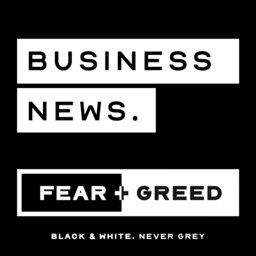Interview: Three themes of reporting season & why they matter
Reporting season is in full swing, and last week we saw results from a host of big Australian companies, including Commonwealth Bank, JB hifi and CSL.
Lochlan Halloway, Equity Market Strategist at Morningstar, takes Sean Aylmer through the three key themes that are emerging this earnings season, the companies that are affected, and what it means for investors.
This is general information only. Seek professional advice before making investment decisions.
In 1 playlist(s)
FEAR & GREED | Business News
Daily business news for people who make their own decisions, with business journalist Sean Aylmer an…Social links
Follow podcast
Recent clips

Dividend investing: How to pick quality income stocks
06:07

Hate legislation on shaky ground; air traffic chaos; Hollywood’s highest grossing actor
15:36

Our $9 billion export that nobody talks about
05:54
 FEAR & GREED | Business News
FEAR & GREED | Business News